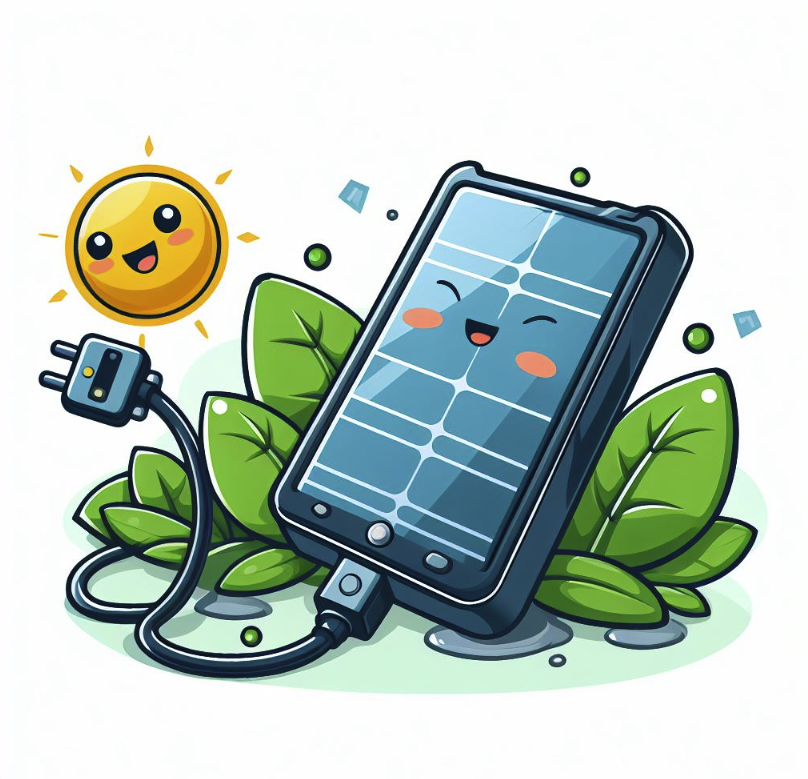With the increasing reliance on electronic devices in our daily lives, the need for efficient charging solutions has become more important than ever.
Traditional chargers have been the go-to option for many years, but the emergence of solar chargers has sparked a debate about which option is more efficient.
Solar Charger:
- Power Source: Utilizes sunlight to generate power for charging devices.
- Eco-Friendly: Offers a green, renewable energy source, reducing carbon footprint.
- Portability: Often designed to be portable and useful in outdoor settings.
- Dependence: Reliant on sunlight, which can be inconsistent.
- Charging Speed: Generally slower and can be affected by weather conditions.
Traditional Charger:
- Power Source: Depends on electrical outlets sourced from the grid or generators.
- Eco-Friendly: Environmental impact depends on the source of the electrical power (e.g., fossil fuels, renewables).
- Portability: Limited to locations with accessible electrical outlets.
- Dependence: Reliable as long as there is access to an electrical outlet.
- Charging Speed: Typically offers faster and more consistent charging speeds.
Solar chargers provide an eco-friendly and portable charging solution, particularly useful in remote or outdoor locations.
Traditional chargers offer faster and more reliable charging in areas with accessible electrical outlets.
Below we look deeper into the advantages and disadvantages of both solar chargers and traditional chargers, and explore which one offers a more efficient charging experience.
Table of Contents
The Rise of Solar Chargers
Solar chargers have gained popularity in recent years due to their eco-friendly nature and the increasing demand for renewable energy sources.
These chargers harness the power of the sun to convert sunlight into electricity, which can then be used to charge electronic devices such as smartphones, tablets, and laptops.
The concept behind solar chargers is simple yet innovative, making them an attractive option for environmentally conscious individuals.
The Efficiency of Solar Chargers
One of the key factors that determine the efficiency of a charger is its ability to convert sunlight into usable energy.
Solar chargers utilize photovoltaic (PV) cells to convert sunlight into electricity.
These cells are made up of semiconductor materials that generate an electric current when exposed to sunlight.
The efficiency of PV cells varies depending on factors such as the quality of the materials used and the design of the charger.
On average, solar chargers have an efficiency rating ranging from 15% to 25%.
This means that they can convert 15% to 25% of the sunlight they receive into usable energy.
While this may seem relatively low compared to traditional chargers, it is important to consider the long-term benefits of solar chargers.
Unlike traditional chargers, solar chargers do not rely on electricity from the grid, which is often generated from non-renewable sources.
By using solar chargers, individuals can reduce their carbon footprint and contribute to a more sustainable future.
The Advantages of Solar Chargers
Solar chargers offer several advantages over traditional chargers, making them a compelling option for many individuals. Some of the key advantages include:
- Portability: Solar chargers are lightweight and portable, making them ideal for outdoor activities such as camping, hiking, and traveling. They can be easily folded or rolled up, allowing users to carry them in their backpacks or pockets.
- Independence from the Grid: Solar chargers do not rely on electricity from the grid, which means they can be used in remote areas where access to electricity may be limited. This makes them a valuable tool for individuals who enjoy outdoor adventures or live in areas with unreliable power supply.
- Cost Savings: While solar chargers may have a higher upfront cost compared to traditional chargers, they can lead to significant cost savings in the long run. By harnessing the power of the sun, users can reduce their reliance on electricity from the grid, resulting in lower electricity bills.
- Eco-Friendly: Solar chargers are a sustainable and eco-friendly charging solution. By using renewable energy from the sun, they help reduce greenhouse gas emissions and minimize the environmental impact associated with traditional chargers.
The Efficiency of Traditional Chargers
Traditional chargers, also known as AC chargers, are the most common type of charger used today.
These chargers convert alternating current (AC) from the electrical grid into direct current (DC) to charge electronic devices.
The efficiency of traditional chargers depends on various factors, including the quality of the charger and the charging cable, as well as the power consumption of the device being charged.
On average, traditional chargers have an efficiency rating ranging from 70% to 90%.
This means that they can convert 70% to 90% of the electricity they consume into usable energy.
While traditional chargers have a higher efficiency compared to solar chargers, it is important to consider the environmental impact associated with their use.
Traditional chargers rely on electricity generated from non-renewable sources such as coal and natural gas, contributing to air pollution and climate change.
The Advantages of Traditional Chargers
Traditional chargers continue to be widely used due to their convenience and compatibility with a wide range of electronic devices. Some of the advantages of traditional chargers include:
- Compatibility: Traditional chargers are compatible with a wide range of electronic devices, including smartphones, tablets, laptops, and gaming consoles. This makes them a versatile charging solution for individuals who own multiple devices.
- Rapid Charging: Traditional chargers are known for their fast charging capabilities. They can deliver a high amount of power to electronic devices, allowing them to charge quickly and efficiently.
- Availability: Traditional chargers are readily available in most households, offices, and public spaces. This makes it easy for individuals to find a charger when they need to charge their devices.
FAQs – Solar Charger vs. Traditional Charger: Which is More Efficient?
1. Are solar chargers as efficient as traditional chargers?
Solar chargers have a lower efficiency rating compared to traditional chargers.
On average, solar chargers can convert 15% to 25% of the sunlight they receive into usable energy, while traditional chargers have an efficiency rating ranging from 70% to 90%.
2. Can solar chargers charge electronic devices as fast as traditional chargers?
Solar chargers generally have a slower charging speed compared to traditional chargers.
The charging speed of a solar charger depends on factors such as the amount of sunlight available and the power consumption of the device being charged.
3. Are solar chargers more expensive than traditional chargers?
Solar chargers tend to have a higher upfront cost compared to traditional chargers.
However, they can lead to cost savings in the long run by reducing reliance on electricity from the grid.
4. Can solar chargers be used indoors?
Solar chargers require sunlight to generate electricity, so they are not suitable for indoor use unless there is access to direct sunlight.
However, some solar chargers come with built-in batteries that can store energy for later use, allowing them to be used indoors.
5. Do solar chargers work in cloudy weather?
Solar chargers can still generate electricity in cloudy weather, although their efficiency may be reduced.
The amount of electricity generated depends on the intensity of the sunlight reaching the charger.
6. Are traditional chargers harmful to the environment?
Traditional chargers rely on electricity generated from non-renewable sources, such as coal and natural gas, which contribute to air pollution and climate change.
Therefore, their use has a negative environmental impact.
7. Can solar chargers be used to charge multiple devices simultaneously?
Some solar chargers are equipped with multiple USB ports, allowing them to charge multiple devices simultaneously.
However, the charging speed may be slower when charging multiple devices at once.
8. Are solar chargers durable?
Solar chargers are designed to be durable and withstand outdoor conditions.
However, the durability may vary depending on the quality of the charger and the materials used.
9. Can solar chargers be used to charge larger devices like laptops?
Some solar chargers are capable of charging larger devices like laptops.
However, it is important to check the power output of the solar charger to ensure compatibility with the device being charged.
10. Do solar chargers require direct sunlight to work?
Solar chargers work best when exposed to direct sunlight.
However, they can still generate electricity in indirect sunlight or cloudy conditions, although the charging speed may be slower.
11. Are solar chargers safe to use?
Solar chargers are generally safe to use.
However, it is important to follow the manufacturer’s instructions and avoid exposing the charger to extreme temperatures or water.
12. Can solar chargers be used at night?
Solar chargers require sunlight to generate electricity, so they cannot be used at night unless they have a built-in battery that stores energy for later use.
13. Are solar chargers suitable for all electronic devices?
Solar chargers are compatible with most electronic devices that can be charged via USB, such as smartphones, tablets, and portable speakers.
However, they may not be suitable for devices that require a higher power output, such as high-performance laptops or gaming consoles.
14. Do solar chargers require maintenance?
Solar chargers require minimal maintenance. It is recommended to keep the solar panels clean and free from dust or debris to ensure optimal performance.
15. Can solar chargers be used during a power outage?
Yes, solar chargers can be used during a power outage as long as there is access to sunlight. They provide a reliable source of power when the electrical grid is down.
Summary – Solar Charger vs. Traditional Charger: Which is More Efficient?
Both solar chargers and traditional chargers have their own advantages and disadvantages.
While solar chargers may have a lower efficiency compared to traditional chargers, they offer several benefits such as portability, independence from the grid, cost savings, and eco-friendliness.
On the other hand, traditional chargers are known for their compatibility, rapid charging capabilities, and availability.
Ultimately, the choice between a solar charger and a traditional charger depends on individual preferences and needs.
If portability, sustainability, and cost savings are important factors, then a solar charger may be the more efficient option.
However, if compatibility and rapid charging are the main priorities, then a traditional charger may be the preferred choice.
Related


